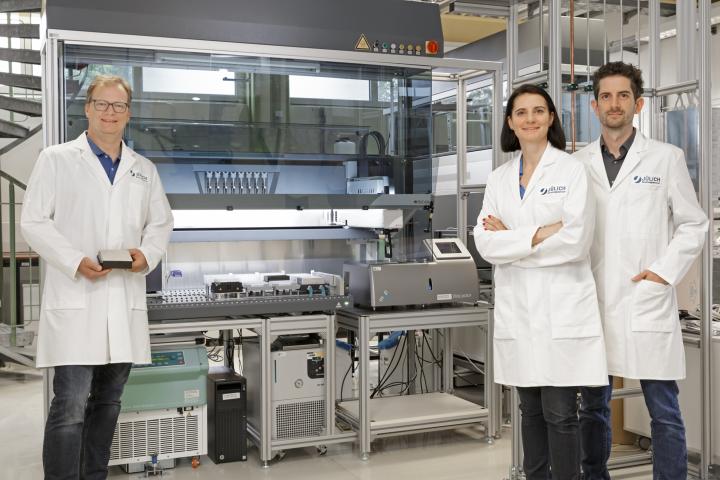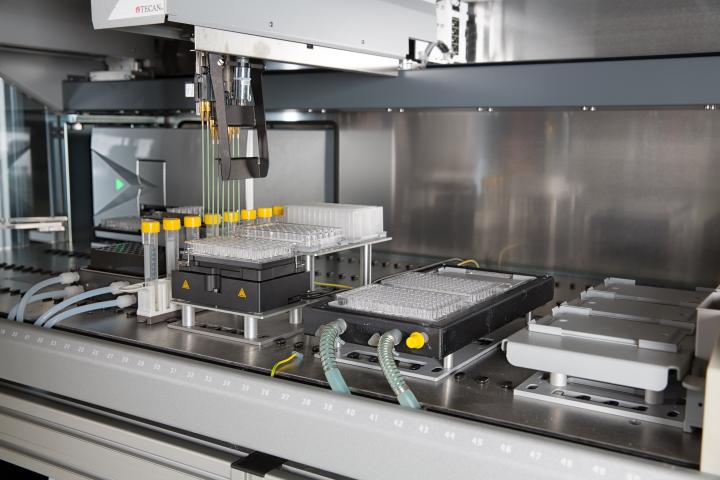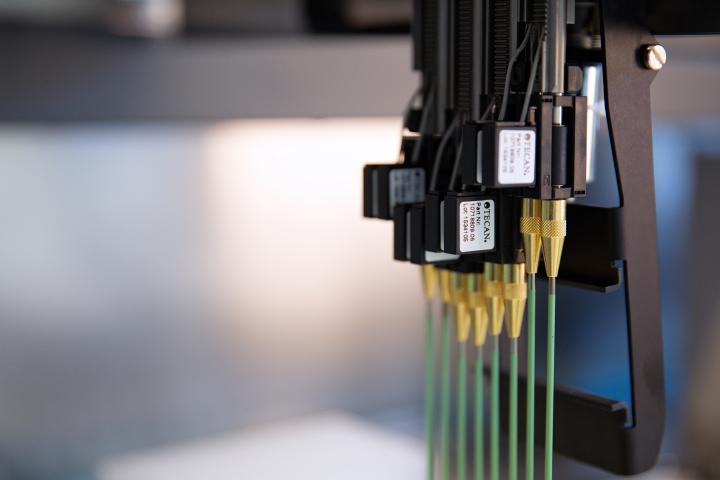Automation offers many benefits for bioprocess development involving multiple microbial strains, yet few off-the-shelf platforms are capable of combining liquid handling tasks with microscale cultivation. The Microbial Bioprocess Lab at Forschungszentrum Jülich needed a customized platform to support its research, and turned to the Tecan Integration Group for a solution that has improved its microbial cultivation workflows.
Forschungszentrum Jülich in western Germany is one of the biggest research facilities in Europe, with around 6,000 employees. The government-funded organization has multiple institutes on campus, tackling a diverse range of fields from supercomputing and physics to informatics and biotechnology. The Helmholtz Innovation Lab ‘Microbial Bioprocess Lab’ (MiBioLab) is part of the Institute of Bio- and Geosciences, and works with industry to investigate the use of renewable resources for fast and cost-effective production of sought-after compounds. Dr. Ing. Holger Morschett, Head of MiBioLab, explained: “The focus of our research is the use of microbial cell factories to convert renewable resources – for example, biomass-derived carbohydrates – into sustainable valueadded products. This could be anything from chemical intermediates for the production of bioplastics to amino acids, organic acids and drugs, as well as industrially- and pharmaceuticallyimportant proteins. Our main tasks are strain phenotyping and bioprocess development, and the large number of genetically-engineered microbial strains that we need to test is a constant challenge. It’s impossible to do this in standard bioreactors, so we have transferred our protocols to a smaller scale system – the BioLector® microbioreactor (m2p-labs) – to give us higher throughput and allow easy automation.”
“The BioLector can run up to 48 experiments simultaneously in microplates, which is far more productive than working with a few bioreactors that require continual monitoring. However, we still faced the challenge of sampling and dosing, which often has to be done during the night or according to the real-time process data. You don’t want to have somebody sitting in front of a bioreactor 24/7, so this motivated us to find an alternative solution. Automation was clearly the answer, so we spoke to a number of providers, including Tecan.”

Left to right: Marco Oldiges, Carin Jansen and Holger Morschett with MiBioLab’s Tecan Labwerx system
The Tecan Labwerx team visited MiBioLab to see the BioLector and talk through the laboratory’s requirements, and was joined by representatives from m2p-labs, which is based just 30 km away. This allowed in-depth discussion between all the parties involved, ensuring that the Tecan Labwerx team had a thorough understanding not only of MiBioLab’s needs, but also of the BioLector and how this microbioreactor system could be integrated into a liquid handling platform. Tecan Labwerx’s biggest challenges were to develop a system that had sufficient space to accommodate the BioLector, and to coordinate movements between the two platforms to enable precise sampling and dosing on a shaking microplate. The result was a customized workstation with a novel configuration – using the workdeck of a Freedom EVO® 150 adjacent to the BioLector system, combined with the liquid handling and robotics capabilities of the larger Freedom EVO 200.
"Integration of the microbioreactor with the Freedom EVO has allowed us to perform experiments in a completely different way, giving us the opportunity to develop and test processes that we simply couldn’t do before."

Left to right: Marco Oldiges, Carin Jansen and Holger Morschett with MiBioLab’s Tecan Labwerx system
Holger continued: “A deciding factor in choosing Tecan was the company’s ability to guarantee what no other provider could. The microplate is sealed with a composite foil to prevent contamination, and is continuously shaken in the BioLector to ensure that the cells have a sufficient oxygen supply. Previously, shaking had to be interrupted for sample extraction or dosing, leading to transient oxygen deficiency and problems with cell viability. Of all the suppliers we approached, only Tecan was able to guarantee that its solution could pierce the foils and carry out the appropriate liquid handling tasks while the plate was still shaking at speeds of up to 1,500 rpm.”
“Integration of the microbioreactor with the Freedom EVO has allowed us to perform experiments in a completely different way, giving us the opportunity to develop and test processes that we simply couldn’t do before, using robotics to fully automate tasks such as media preparation, sampling, dosing and cell separation. The integrated platform has expanded what it is possible to do with the BioLector, and allowed us to gather the type of data you might expect from a well-equipped lab-scale bioreactor. For example, we can take samples and measure substrate and product concentrations around the clock – something we couldn’t normally do with microliter volumes.”

“Harvesting cells at the right time point is not particularly easy to manage manually, but automation has provided the solution, thanks to two-way communication between the microbioreactor and Freedom EVO system. The BioLector measures parameters such as biomass, pH and dissolved oxygen levels in real time, then notifies the liquid handling platform of the location of wells that need to be sampled or harvested, and the aspiration volume required. The Freedom EVO has everything required for sample processing integrated onto the workdeck – including a centrifuge, vacuum filtration station, microplate shaker, microplate cooler and an Infinite® M200 microplate reader – so samples can be processed immediately. The clear benefits of this approach led to us purchasing a second platform in January 2018, and both systems are now in use 24/7; I often have to book several weeks ahead when I need to use one of them!”
“Working with the system is straightforward. We had some training on Freedom EVOware® when the first platform arrived, and had simple workflows in operation after just four weeks, and more complex ones within three months. We were able to get our second system up and running after just one week of testing and transferring scripts. We have welcomed the support from Tecan, particularly for software integration, and know where to get help if we need it. It’s all working well,” Holger concluded.
To find out more about Tecan Labwerx, visit www.tecan.com/labwerx
To learn more about MiBioLab and see the automated platform in action, go to www.fz-juelich.de/mibiolab









